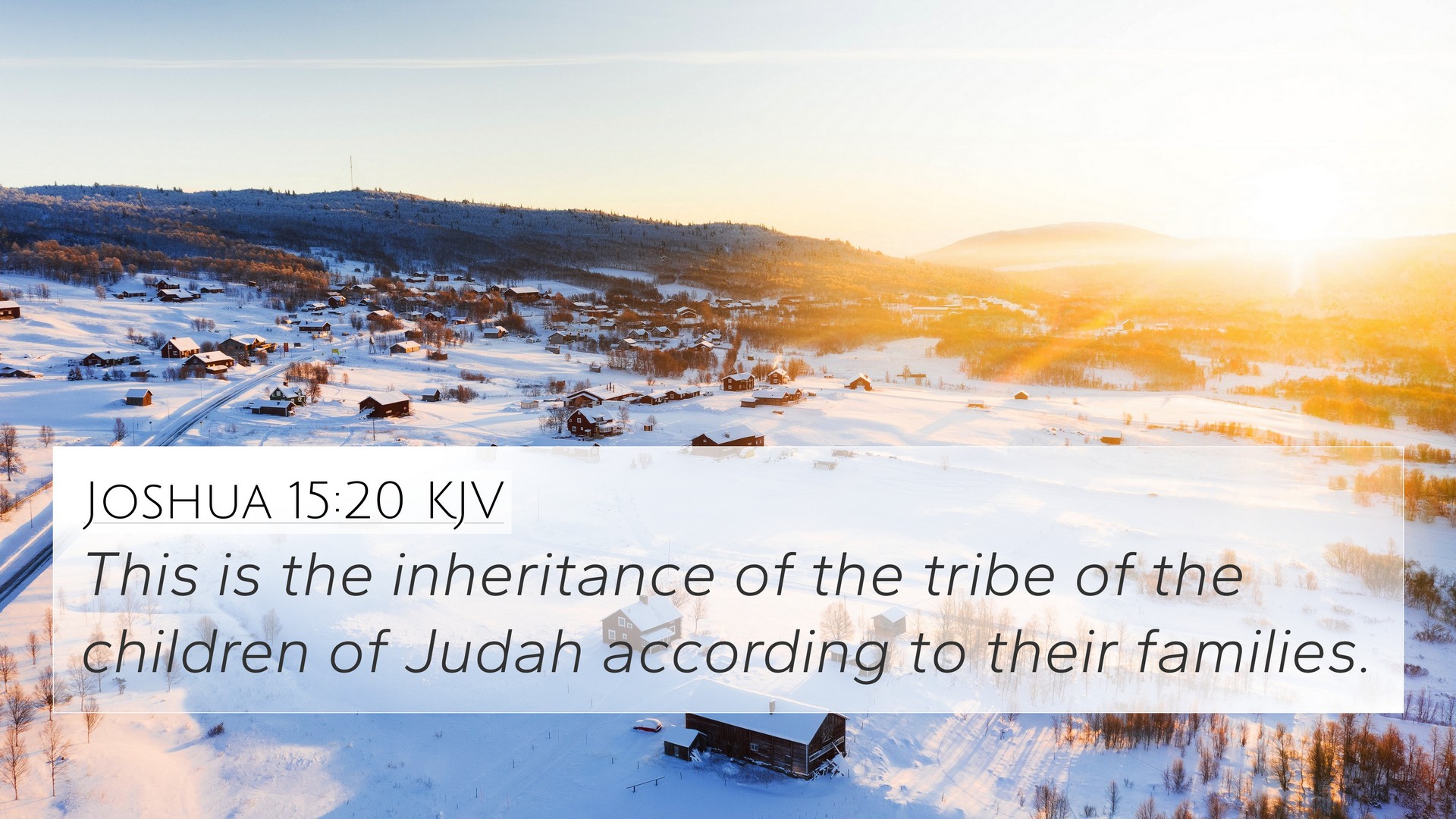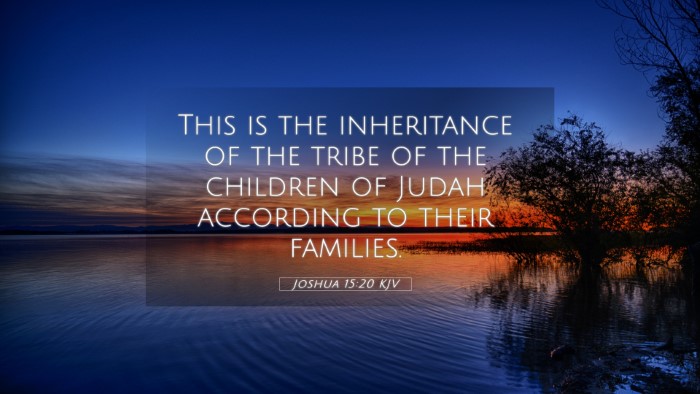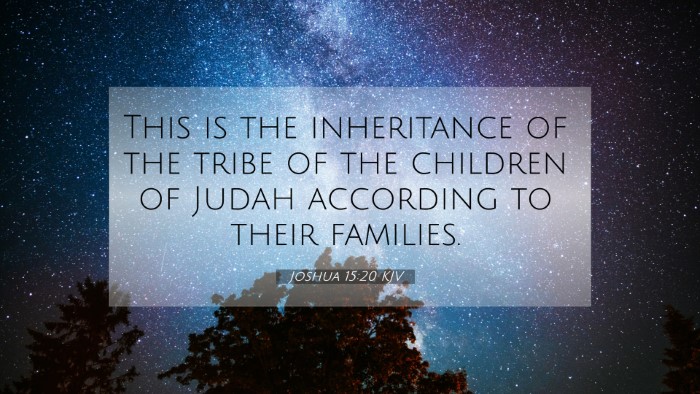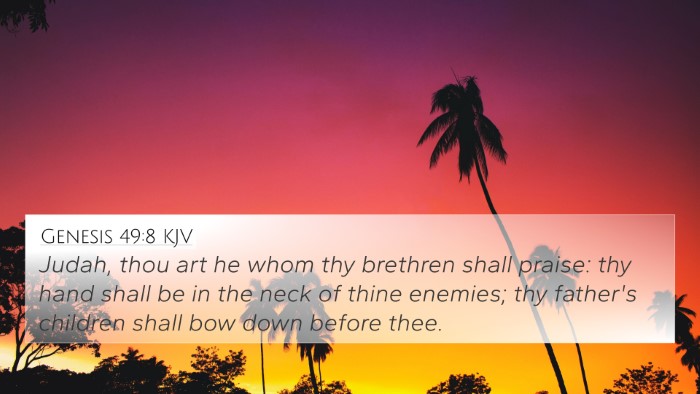Understanding Joshua 15:20
Joshua 15:20 states: "This is the inheritance of the tribe of the children of Judah according to their families." This verse is a pivotal moment in the Book of Joshua, marking the delineation of land allotted to the tribe of Judah, a central theme in the narrative of Israel's conquest and settlement in Canaan.
Summary and Interpretation
The verse encapsulates several key themes important for comprehension:
- Divine Providence: The allocation of land represents God's faithful fulfillment of His promises to Abraham, Isaac, and Jacob regarding their descendants inheriting the land.
- Tribal Identity: By stating “the tribe of the children of Judah,” it emphasizes the distinct identity and heritage of the Israelites, particularly to Judah, which would later be associated with kingship through David and, ultimately, Jesus.
- Family Structure: Reference to ‘according to their families’ shows the organized structure of society in ancient Israel and the importance of familial lines in the inheritance process.
Commentary Insights
According to Matthew Henry, the inheritance signifies God’s promise of land to the Israelites and how significant the tribe of Judah was among them. Albert Barnes emphasizes that this division of land demonstrates God's sovereignty as He determines each tribe's portion according to His divine plan. Adam Clarke points out the deep historical context of Judah’s inheritance, connecting it to the blessings promised through Jacob’s prophetic words regarding his sons.
Cross-References and Thematic Connections
This verse not only establishes its own meaning but creates interconnectedness with various other biblical texts. Below is a list of relevant cross-references that enhance the understanding of Joshua 15:20:
- Genesis 49:10 - "The scepter shall not depart from Judah..." (Prophetic significance of the tribe)
- Numbers 34:3-4 - "Your southern boundary shall extend from the wilderness of Zin..." (Outline of land borders for Judah)
- Deuteronomy 1:8 - "See, I have set the land before you..." (God’s command to take the land)
- Joshua 14:6 - Caleb’s request for his inheritance as a representative of Judah.
- Revelation 5:5 - "The Lion of the tribe of Judah..." (Linking the tribe to messianic fulfillment)
- 1 Chronicles 5:2 - "For Judah prevailed above his brethren..." (Judah's preeminence among the tribes)
- Luke 3:33 - "Which was the son of Amminadab, which was the son of Admin..." (Genealogy of Jesus, emphasizing his lineage from Judah)
- Ezekiel 48:21 - "And the rest shall be for the prince..." (Signifies the land structure and its divisions)
- Hebrews 7:14 - "For it is evident that our Lord sprang out of Judah..." (Acknowledging Jesus’ lineage)
Thematic Bible Verse Connections
The significance of inheritance in Joshua 15:20 harkens back to many related themes in both the Old and New Testaments. A few notable connections include:
- Inheritance and Promise: How God's promises, like land and blessings, are fulfilled throughout generations.
- Leadership and Kingship: The association of Judah with kingship, as seen in the stories of David and Solomon.
- Spiritual Inheritance: Inheritance themes extend into the New Testament where believers in Christ are seen as heirs to God’s promises (Romans 8:17).
Conclusion
Joshua 15:20 serves as a fundamental verse reflecting on God's faithfulness in fulfilling His promises, the importance of identity, and mandated distribution of land to His people. When studied in conjunction with other verses, it becomes clear how these themes of inheritance, divine promise, and tribal significance weave together the story of Israel and point to the larger redemptive narrative found in Jesus Christ.
Further Study and Application
For those interested in exploring deeper theological insights and connections, utilizing tools for Bible cross-referencing will enhance your understanding of the intricate web of relationships between different scriptures. Engaging in comparative Bible verse analysis aids in discovering how themes echo throughout God's Word, enriching one's study of the Bible.
For Further Exploration:
- How to use Bible cross-references: Techniques for connecting themes across scripture.
- Identifying connections between Old and New Testament: Discover how foundational truths in the Old Testament light the path of New Testament revelations.
- Tools for Bible cross-referencing: Resources that enhance cross-referencing and thematic studies.




